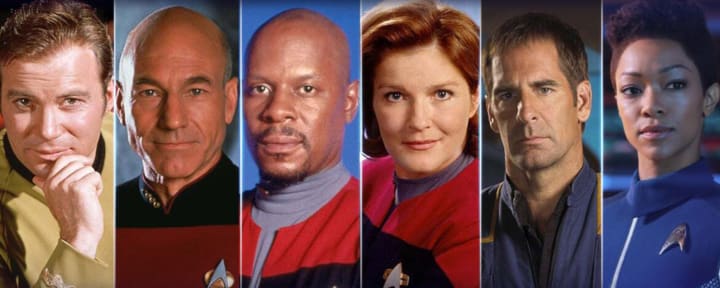Don't know what to watch next? Star Trek.
When faced with many choices but no decisions, Star Trek can help.

Despite system recommendations or even our own list of saved-up shows to watch later, it feels like nothing could possibly fill the void of the show we just finished.
Using the decades-long sci-fi series Star Trek as a talking point, I will endeavor to help you figure out what to watch next. After all, that one show you might have been avoiding might end up becoming one of your favorites.
Most of us were taught to not judge a book by its cover in our youth. A personal rule of mine has always been to give a new show a couple of episodes before I decide to move on. A lot of writers have trouble ending stories and many of us notice this pretty easily, but at the same time, many writers also have trouble starting a story. Just the other day my friend picked up a popular series that I recommended to him a while back. I had regarded that series as one of my personal favorites and exclaimed how you just want to see these characters succeed and things just keep exponentially getting better and better, but the thing is, he almost dropped the series entirely after just starting it. Until I told him to keep going.
I want to use Star Trek as a talking point because we, as regular people, have preferences and biases, so recommendations from the masses may be entirely wrong from our point of view. If you're already a Trek fan then you'll understand more so than others. People have favorites, people will hold up Star Trek the original series as the best of them all and look down on anyone who liked the newer movies with Chris Pine as new Kirk. On the reverse of that, you'll have people who think the original series utilized some of the silliest ideas possible and that a series like Discovery is no different for whatever reason they deem appropriate. To a degree, you can find this mentality among any genre or fandom. But then you have people like me, someone opened minded enough to give things a chance and ends up liking every single series for a different reason regardless of how I felt going in.
I didn't always hold this mentality though, in my younger years I would pass by my dad watching Star Trek the next generation and think nothing of it. I would hold an aversion to things I perceived as popular and seek out a series that may not have gotten a lot of attention. Although it took a while over the years, this is how I got into giving each series a good couple of episodes before really judging it.
I'm currently 26 years old and although my younger self wouldn't have given Star Trek a second glance, I currently couldn't imagine where I would be mentally without giving those first couple episodes a chance.

My first Trek Series was Enterprise, this was one of my first introductions into science fiction in general, and didn't have many expectations going into it. Although many in the fandom seemingly regard it as the black sheep of the family I actually loved it. After giving it a couple episodes I found I was hooked to it as the beginning of everything, and ended up seeing it as the underdogs making their way into the universe. All I wanted was to watch them succeed.
It was only after finishing that series did I realize that I had to resolve myself to go deeper, I couldn't judge each of these series solely based on what everyone else was saying.

Moving onto the Original Series, I found myself drawn to the novelty of it all. I didn't find myself annoyed at the old writing and silly ideas, I thought it was simple and refreshing. I think it was primarily thanks to Chris Pine playing Kirk in the Kelvin timeline that I had such an appreciation for Leonard Nimoy and William Shatner in their original work.

The Next Generation was seen, obviously, as the next generation of ideas. Although it was certainly before my time, I always felt like it was going through a period of transition alongside our society, trying to find itself. Seeing as how it paved the way for the rest of Star Trek as we know it, it's safe to say it succeeded. What I gleamed from the first couple episodes of TNG was purely potential. For this series in particular, what kept me here wasn't the characters or the events as a whole, it was the growth as individuals and the growth of ideas. It's safe to say it ended far away from where it started.

It was that growth of ideas that paved way for Deep Space Nine and Voyager. Both of these series had me take the first couple episodes approach and do it a second time with hope that there would be something to keep me there. Between the other series and even the movies, I had expectations this time around and it was hard getting into an entirely new story despite it being Star Trek. Undoubtedly they had a rougher start than most, but bit by bit I slowly found things I liked. Before long those little things piled up into something I was happy to be watching, another long haul that I was happy to be apart of.
Deep Space Nine brought about a new atmosphere from what I was used to, it wove together unexpected elements like the Bajoran's spirituality and socioeconomic struggles and the station's technological deficiency compared to what we were used to with the starship Enterprise. Before long I found that what kept me here was the accumulation of what seemed like small victories over the course of the seasons, all leading up to one big ending. I found myself, like many others in the fandom, looking at this series as the possible favorite out of all the different series. Although nostalgia definitely helps, the show rightfully earned it.
While Voyager was an equally rough start, it also found its footing with its characters being similarly disadvantaged, although this time via pure isolation. A different atmosphere with different struggles. It succeeded in satisfying the itch left by the other shows but it largely felt like it fulfilled the role of an extended supplement. A Trek series for the sake of Trek itself. Although the ending left a lot to be desired, this one fulfilled its role to the best of its ability.

Many years later, we arrive at the 3rd generation of shows. Picard, Discovery, and Lower Decks. It's safe to say the writing as a whole changed drastically since the previous generation of shows, a change that many of the fandom clashed with at first. When comparing something new through the lens of nostalgia, it seems like the further away something is, the stronger it becomes. And that makes new ideas even harder to succeed. With the change in news outlets and social media between now and the previous era, the amount of hate this new generation received seemed overwhelmingly one-sided. Despite all of this, the first couple episodes method held true and I was hooked once again.
Picard, as short as its first season was, honestly had me hooked within the first 2 minutes. For me, plenty of time had passed since watching The Next Generation that I felt the joys of the past flooding back to me all before the new plot ever began. In those first 2 minutes, hearing Picard tell Data "I don't want the game to end" felt largely symbolic for Star Trek as a whole, and seeing it play out as a dream only solidified that feeling for me.
This series was visually gorgeous and on the outside seemed largely like one big art piece between its writing and visuals. Although the plot this time around came off as a drama more than anything, I think it succeeded more than other current shows did with this formula. By the end, I had found that what kept me here was a mix of curiosity and nostalgia. I kept craving wanting to know what happened next, a specific feeling I hadn't experienced in the other Trek series. And as powerful as nostalgia can be, Picard met the bar set by its predecessors and the trickling of familiar faces and old plot points here and there made that possible. I now see this show as one last adventure tied to the previous generation and I enjoyed every minute of it.
Discovery is a bit more unique when compared to everything else. It takes the experience of every single Trek series that came before it, uses the Kelvin timeline movies as an aesthetic starting point, and puts the plot in a time period before Kirk. Using the newer movies as the new standard for Trek, it settles us in for another long haul. Discovery from what I've seen felt like a revival of Trek as a whole for the current generation. I didn't truly know what to expect when I first went into it, after the first couple of episodes is when I realized it was an amalgamation of all the good stuff from the past brought together. Although life hasn't quite let me proceed to seasons 2 and 3 yet, I can safely say season 1 for Discovery succeeded in its own way just as each of its predecessors did before it.
Lower Decks aimed at a specific audience within our current generation. In the past, we saw the transition of shows like Family Guy and Futurama into shows like Bob's Burgers and Rick and Morty. Lower Decks landed itself right in the middle of that particular audience and I think that's why its received scorn from the fandom. Although I enjoy this type of show, it's no longer something I pursue with the shows I watch. Thankfully I was surprised at how much I liked it and ended up binge-watching the first season. Aside from being a comedy, what kept me here was that the show succeeded in being able to make fun of itself and didn't take itself seriously, all while holding true to the Star Trek universe as a whole. If this show was a metaphorical gamble as to what may or may not work within Trek, it definitely paid off.

What I'm reminded of over the years is just how much this method works, even outside of Trek I've found things I truly enjoy but almost never gave a second glance. One thing I always keep in mind is that each show you find largely reflects the times in which it was created, keeping this in mind modulates my own thinking when judging these shows. So instead of comparing all of these shows against each other, I judged them against itself and in some cases, against the generation it was born into. Each one ended up being a unique show completely different from the rest.
We were all taught to not judge a book by its cover; I think you shouldn't judge a series by what other people are telling you.
(If you're curious about watching any Star Trek after reading this, they're a bit spread out between Netflix, Amazon and Paramount+.)
About the Creator
Kevin
This place is neat.
Enjoyed the story? Support the Creator.
Subscribe for free to receive all their stories in your feed. You could also pledge your support or give them a one-off tip, letting them know you appreciate their work.






Comments (1)
Super!!! Excellent story!!!